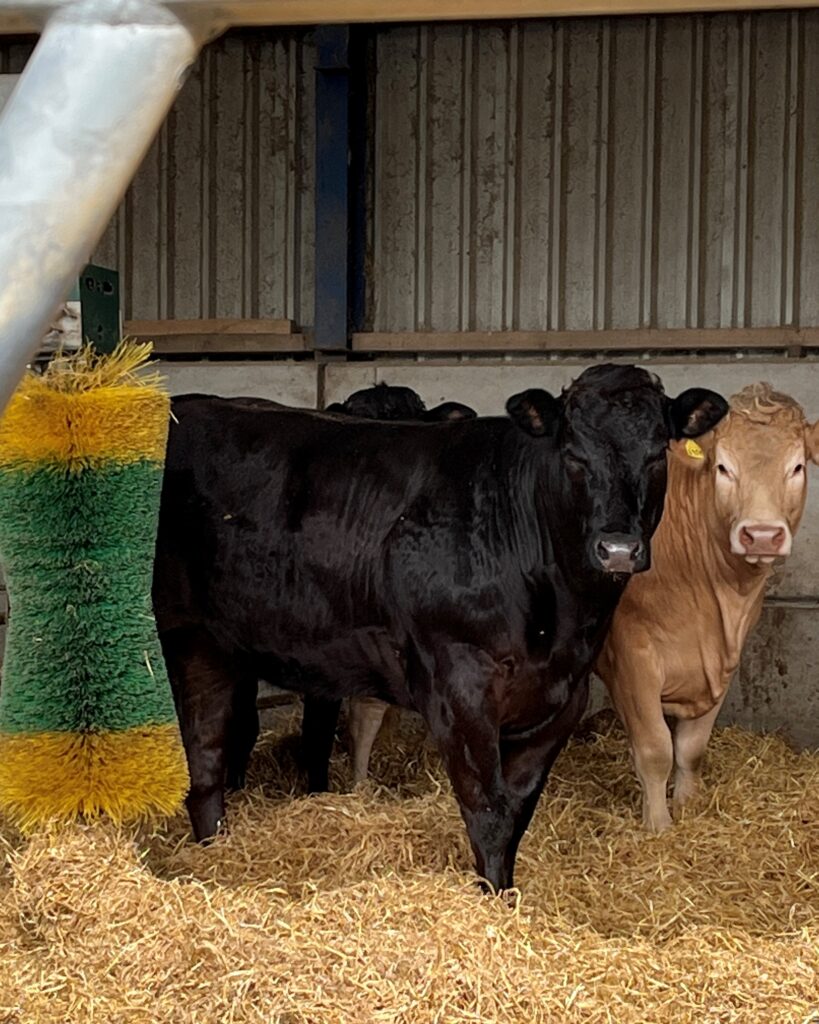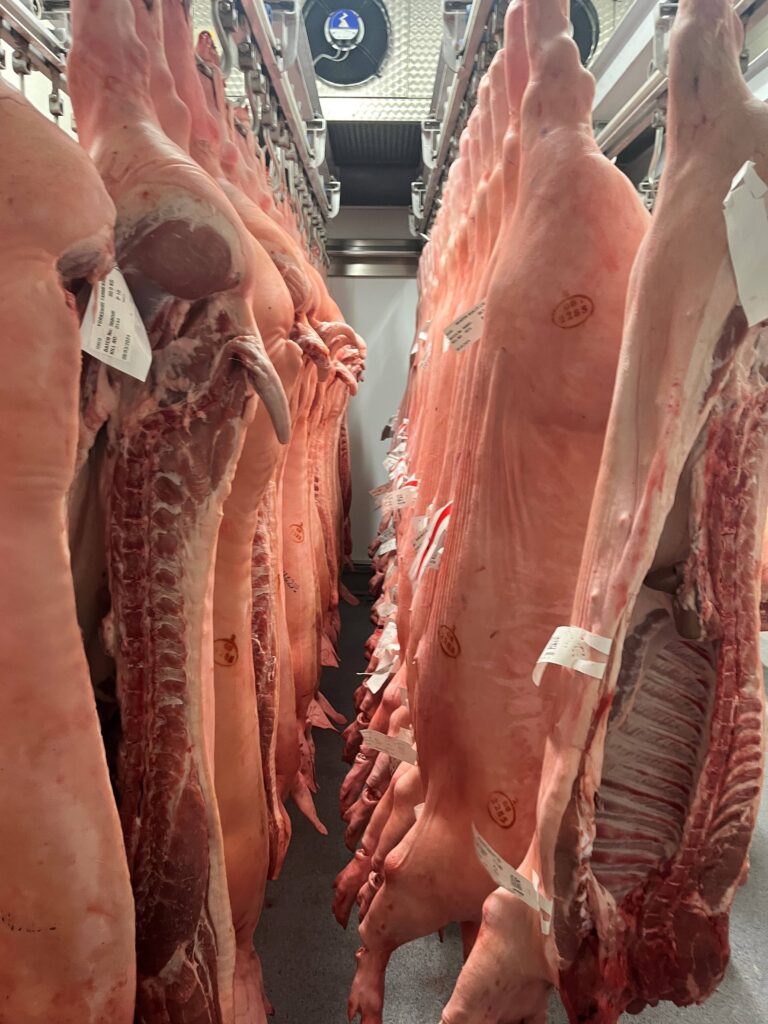April 17, 2024
Securing a sustainable future at R&J Yorkshire’s Finest

At every step of the journey from field-to-fork, we keep the environmental impact of our farming and butchery business top of our minds. Our aim is to secure long-term viability of R&J Yorkshire’s Finest for future generations and our wider rural community.
Our farm
Since R&J began, we have operated a sustainable farming practice here at Waterford Farm. Now in our fifth generation as custodians of this land, our commitment to a ‘regenerative’ way of farming is stronger than ever. Regenerative farming fosters methods that are not only productive, but also environmentally sustainable and resilient to climate change, with a strong focus on soil health.
One of our main focusses has been on improving our soil and increasing species diversity. We farm using mob grazing techniques to minimise soil disturbance. This helps to build soil organic matter which is vital to the long term health of the soil. It also helps produce fantastic grass and clover coverage that our slow grown cattle need to fatten naturally.
This holistic way of farming, moving away from industrial methods of high artificial fertiliser and chemical input, with consideration to our impact on soil structure and biodiversity, not only benefits the environment but also supports the health and well-being of consumers.
Our customers
Our clients are increasingly aware of how farming in this way benefits not only the environment, but also the quality of the meat we sell. Consumers are now asking questions about the food they purchase. Where does it come from? How is it grown? Is it produced in a sustainable way?
With 100% traceability and knowledge of provenance, combined with excellent quality control, we are able to answer all of these questions, and help our customers make informed decisions about the meat they buy. We are immensely proud of our deep knowledge of our own livestock rearing here at Waterford Farm, as well as the shared values of our high welfare, sustainably-minded suppliers.
Our herd
Our cattle reared on Waterford Farm are entirely grass-fed and fattened naturally to an age of around 36 months.
To ease the pressure on the land during the wetter months, our cattle are kept inside in barns from around November until March/April depending on the season. This protects the soil structure and allows the grass to rejuvenate quickly in spring.
As always, during the winter the welfare of our cattle is our number one priority. They are fed home-grown silage or hay, and live a very relaxed life with every comfort taken into consideration, including a bed of fresh straw each day and an automated back scratcher to keep them happy!
We choose stock well suited to our farmland, with the right confirmation and breed characteristics that will thrive in the Yorkshire Dales.

Our suppliers
For over 40 years we have carefully grown a cooperative of like-minded farmers and suppliers who share our values and most importantly our commitment to sustainability. By partnering with local producers who uphold the highest standards of animal welfare and environmental stewardship, we can ensure that every step of our supply chain reflects our values and endeavour to be as directly ‘field-to-fork’ as possible. This not only supports the local economy but also fosters a network of producers dedicated to sustainable agriculture.
Our large free-range Poulard chickens, farmed exclusively for R&J, and our turkeys, are slow-grown and reared in a high welfare environment on Yorkshire grass pastures. Our pork, sourced from local farmers comes from native breed pigs, that spend their lives foraging in Yorkshire Woodlands.
Game is one of the most sustainable sources of meat available. R&J is lucky enough to be in the heart of the Yorkshire Dales and literally in the midst of some of the country’s best shoots on well managed estates. This allows us to keep our food miles and carbon footprint low. The number one priorities of our suppliers are animal welfare and moorland conservation. The game industry is fundamental to the sustainable management of our countryside environment.

Whole carcass butchery
As true ‘Nose-to-Tail’ Butchers, we are conscious of making use of all parts of the animals, leaving very little to waste. It is a delicate balance of making sure we keep pace with the demand for more popular prime cuts for our chefs, while making sure we are using the entire beast including the lesser-known parts.
With this in mind, we encourage our home cooks to use more unusual cuts, many suitable for ‘Low & Slow’ cooking methods. These are prepared by our expert butchers with just as much care as our prime cuts, and as a result are in high demand from our Chefs, who are skilled at developing new and innovative ways of using all parts of the animal. Our ‘Ox’ cheeks for example, were so unpopular in the past they were given away as dog food. Today they are now one of our most coveted cuts for slow cooking.
Where possible nothing goes to waste during all stages of production. Once the Himalayan salt bricks are past their effective life in our Salt-Ageing Chambers, these are then given to the cattle as salt-licks to support their nutritional requirements. All cardboard packaging is recycled using our own baling machine on site.

Energy saving innovation
We are always looking for ways to reduce our energy consumption within the production unit. Our Plate Heat Exchange system was installed in the last couple of years whereby the heat energy that is expelled from 14 fridges is harvested. This energy is then transferred into heating the water which is used for all the hygienic washing of the entire factory on a daily basis. This equates to having a constant supply of 3000 litres of water heated to 50 degrees for free.
We also have automatic thermostatically controlled energy devices which are fitted to 12 of our biggest fridges. These enable us to maintain the optimum temperatures of our refrigerated rooms rather than constantly powering them unnecessarily. This therefore is more efficient both in terms of energy consumption and expenses.
Sustainability is at the core of everything we do. From regenerative farming to our supplier partnerships, we’re committed to reducing our environmental footprint while consistently delivering top-quality meat. Through ‘Nose-to-Tail’ butchery and minimal waste, we continue to forge a path towards a more sustainable future for generations to come.



Leave a Reply